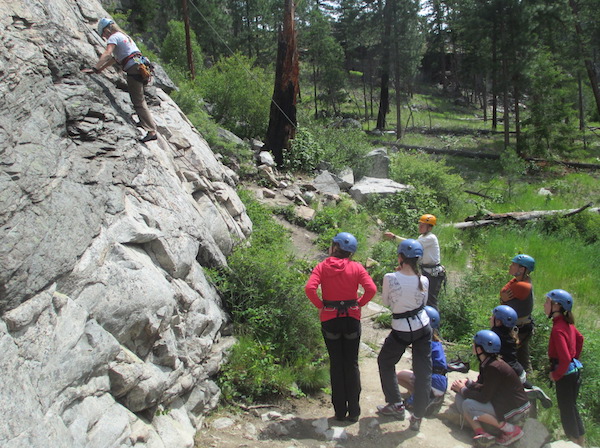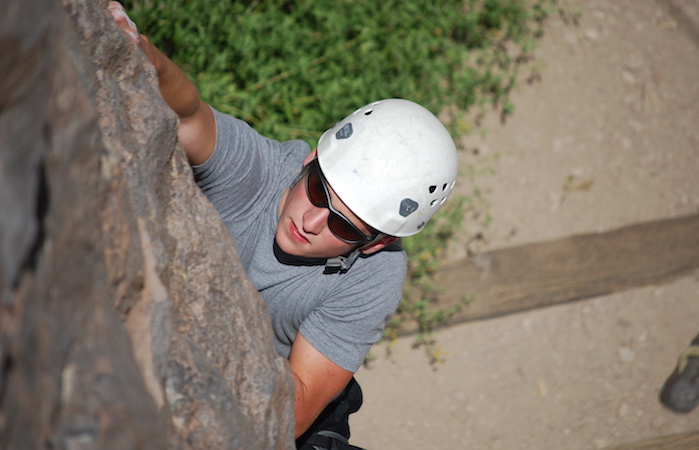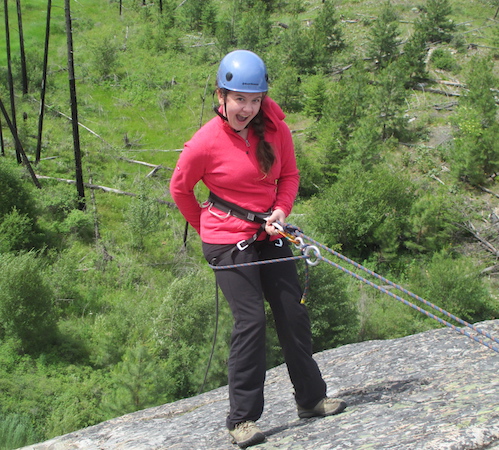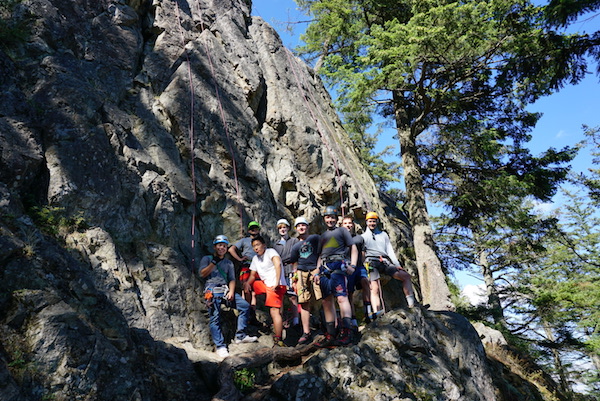Rock Climbing Camp Overview Climbing, climbing education, camping and fun with other teens are at the heart of the American Alpine Institute Rock Climbing Camp. This program provides 15 to 17-year-olds with challenge and adventure. The core focus of the program is to provide climbing instruction, risk managment strategies and to build confidence and self-esteem. Additionally, students will receive instruction in baseline camping and outdooor cooking skills.
A student works through a baseline rescue skill. Andy Stephen
The Rock Climbing Camp is a comprehensive introduction to rock climbing, both for beginners who have never climbed before and for indoor climbers who want to transition into outdoor rock climbing or alpinism.
The course has three primary components:
Movement skills , including techniques that are hard to learn indoors, such as jamming and friction climbingTechnical systems , including knots, anchors, belaying, rappelling, and toprope site managementJudgment skills , including route-finding, recognizing hazards, and risk management
A fourth, less heralded part of the program, are the non-technical camping skills that the team will employ at a front-country campground near the crag.
Goals and Objectives
A student practices rappelling. Jason Martin
The Outdoor Rock Climbing course was developed to provide, not only the experience of rock climbing, but also the technical skills required to go climbing without the oversight of an instructor or guide. By the end of the course, students will have the knowledge required to set-up and manage their own single-pitch climbing sites independently.
Indoor climbing gyms have made it possible for many people to try, and even master, the most iconic type of rock climbing – steep face climbing – without going outside. Outdoor rock climbing, however, demands a much larger repertoire of movement and problem-solving skills than gym climbing.
Outdoor rock climbs don’t announce themselves with colored tape and holds. Learning to route-find often challenges beginners and indoor climbers, who don’t yet know how to recognize usable rock features like underclings, parallel-sided cracks, and small irregularities of the rock surface. Gym climbers who have advanced to the higher number grades can still be stymied by outdoor climbs with features such as jam cracks, chimneys, and friction slabs.
American Alpine Institute Instructors
A student demos an anchor she built near the ground. AAI Collection
Staff members at AAI are among America's most accomplished outdoor educators and climbing instructors. They don't just theorize about leadership in the outdoors. They are true leaders in their profession. All AAI guides are formally trained climbing and mountaineering guides, hold AMGA training, hold Leave No Trace Trainer or Master Educator certifications, hold Wilderness First Responder First Aid Certifications and have advanced mountain and high-angle rescue skills.
Rock Climbing Camp Details All students must be between the ages of 14 and 17 at the time of the program and must posess a high level of maturity.
Itinerary
Day One:
A teen group topropes at a beginner crag. Jason Martin
Travel to Bellingham, WA and meet at the American Alpine Institute headquarters by 3pm. Once everybody has arrived, the team will complete an equipment check and students will be issued camping and climbing gear. Once this has been accomplished, they will travel to a campground where they will set-up camp and make dinner together.
Day Two:
The team will get up early and travel to Mt. Erie. There, they will engage with the following curriculum:
Selection, use and care of climbing gear.
Introduction to basic knots and hitches. Knots to be covered will include but not be limited to the figure-eight follow-through and the clove-hitch.
Introduction to climbing commands and belay technique.
Develop an understanding of climbing grades.
Develop techniques for climbing beginner and intermediate rock climbs.
Once the day is complete, they will return to camp to make dinner and to enjoy a campfire.
Day Three:
On the third day of the program, the team will once again travel from the campground to the crag. From there, they will:
A teen climber learns to rappel.
Review knots from the previous day and then continue the development of their knowledge of knots by learning the figure-eight on-a-bite, the munter-hitch, the overhand, the water-knot, the barrel knot and the autoblock hitch.
Introduction to climbing guidebooks and route topos.
Learn how to place and remove both passive and active rock protection.
Introduction to the concept of SRENE and 12-point anchors.
Develop the skills to build both pre-equalized and self-equalizing anchors.
Learn how to set up simple top-ropes using bolts.
Practice and discuss bouldering technique in an outdoor environment.
Introduction to basic rappelling technique.
Continue the development of movement skills for intermediate rock climbs.
Once the day is complete, the team will once again make their way back to camp for dinner and a campfire.
Day Four:
On the fourth day, the team will once again return to Mt. Erie. There they will:
A complex toprope to rappel transition. Jason Martin
Review knots from the previous days and then continue the development of their knowledge of knots with the double-bowline, the double-fisherman's knot, the mule-hitch, the kliemhiest, and the prussik-hitch.
Learn how to use traditional climbing gear to set up a simple top-rope anchor.
Develop the skills to belay a lead climber.
Learn how to follow a route that has been lead with traditional gear and clean the equipment off the route as they climb.
Develop advanced techniques for rappelling.
Continue the development of movement skills for intermediate rock climbs.
Once the day is complete, they will return to camp for another night of good food and a campfire.
Day Five:
Day five is the final instructional day. The team will make their way to Mt. Erie one last time. There they will:
Review all of the knots and hitches from the previous days.
Use traditional climbing gear to set up a complex top-rope anchor.
Learn how to use a static rope or webbing to set up a multipart top-rope anchor.
Practice the rappel techniques that have been developed over the preceding days.
Continue the development of movement skills for intermediate rock climbs.
When the day is complete, the team will go out for a celebrational dinner before returning back to camp for their final night.
Day Six:
On the final day, the team will get up and have breakfast. They will break camp and then make their way back to Bellingham. From there, the students will say good-bye to one another and head home.
Rock Climbing Camp Dates and Information
July 11 - 16, 2024
Aug 01 - 06, 2024
NOTE: This course may be combined with the Leaders of Tomorrow program to extend to 12 or 17 days and cover Mountaineering and alpine rock climbing. Inquire with a program coordinator for details.
Inclusions and Exclusions
A steep slab climb at Mt. Erie. Jason Martin
This is an "all-inclusive" program. The following items are included in the price:
Professional Climbing Instructors
Climbing and Camping Permits
Camping for every Program Day
Food (Camping, Restaurant Food and Snacks)
Travel During the Program (AAI will provide a van for the duration of the course.)
All Program Rentals.
Transportation from the Seattle Airport to Bellingham or Transportaiton from the Bellingham Airport to AAI's Headquarters.
All Group Equipment.
Excluded from the price is travel to the Seattle or Bellingham Airport, personal equipment/clothing, and guide gratuities.
Rock Climbing Camp Related Courses
Program Finder
By Location
United States - Alaska
United States - Washington
United States - California
United States - Nevada
United States - Colorado
United States - Utah
Canada - British Columbia
South America - Argentina
South America - Bolivia
South America - Ecuador
South America - Patagonia
South America - Peru
Europe - Alps and Caucasus
Asia - Nepal and Tibet
Asia - Laos, Thailand, & Vietnam
Asia - China
Asia - Japan
Africa - Tanzania
Pacific and Antarctica
By Program Type
Instructional Courses
Group Summit Climbs
Expeditions
Skills Expeditions
Private Guided Programs
Treks, Tours, & Backpacking
Corporate Outings & Services
Government & Military
By Activity
Rock Climbing
Ice Climbing
Alpine Climbing
High-Altitude Climbing
Trekking and Backpacking
Skiing & Snowboarding
Guide Training & Rescue
Avalanche Training
Departure Month
Difficulty Level
Beginner
Moderate
Intermediate
Advanced
Very Advanced
x



